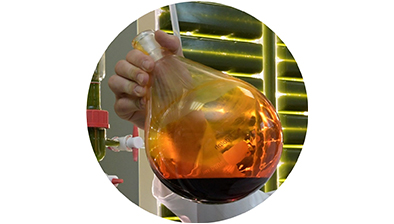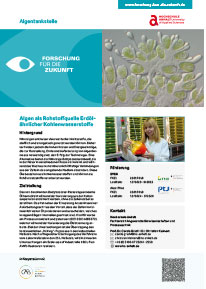Milking von Mikroalgen: Algen als Rohstoffquelle Erdöl-ähnlicher Kohlenwasserstoffe

Mikroalgen enthalten viele wertvolle Inhaltsstoffe, die stofflich und energetisch genutzt werden können. Bisher verhindern jedoch die hohen Kosten und Energieeinträge, die zur Herstellung, Ernte und Aufarbeitung von Algenbiomasse notwendig sind, den Erfolg der Technologie.
Eine Alternative bietet die Mikroalge Botryococcus braunii, die in der Natur in verschiedenen Races vorkommt und während des Wachstums kontinuierlich ölhaltige Verbindungen aus der Zelle in das umgebende Medium absondert. Diese Öle bestehen aus Kohlenwasserstoffen und können als Rohölersatzstoffe verarbeitet werden.
Das von bestimmten Botryococcus-Races abgesonderte Öl kann direkt während der Kultivierung aus der Kultursuspension extrahiert werden, ohne die Zellen dabei zu zerstören. Das hat neben der Einsparung kostenintensiver Aufarbeitungsschritte den Vorteil, dass die Zellen kontinuierlich weiter Öl produzieren und ausscheiden, welches in regelmäßigen Intervallen geerntet wird.
Hierfür wurde ein Prozess entwickelt und patentiert (DE102014005372), welcher während der Kultivierung die Ölabtrennung erlaubt. Ziel der Untersuchungen ist die Übertragung des kontinuierlichen „Milking“-Prozesses in den industriellen Maßstab. Nach erfolgreicher Übertragung des Verfahrens vom Labormaßstab in den 25 L - Maßstab, wird in aktuellen Untersuchungen ein Scale-up auf industrielle 180 L Flat-Panel-Airlift -Reaktoren realisiert.
ENGLISH - Milking of microalgae - Algae as a raw material source of petroleum-like hydrocarbons
Microalgae contain many valuable substances that can be used for material and energy purposes. However, the high costs and energy inputs required to produce, harvest and process algae biomass have so far prevented the technology from being successful. The microalgae Botryococcus braunii, which occurs in nature in various races and continuously secretes oily compounds from the cell into the surrounding medium during growth, offers an alternative. These oils consist of hydrocarbons and can be processed as crude oil substitutes.
The oil secreted by certain Botryococcus races can be extracted directly from the culture suspension during cultivation without destroying the cells. In addition to saving cost-intensive processing steps, this has the advantage that the cells continue to produce and excrete oil, which is harvested at regular intervals.For this purpose, a process was developed and patented (DE102014005372), which allows oil separation during cultivation. The aim of the investigations is to transfer the continuous “milking” process to an industrial scale. After successful transfer of the process from laboratory scale to 25 L scale, a scale-up to industrial 180 L flat-panel airlift reactors is being realized in current investigations.





